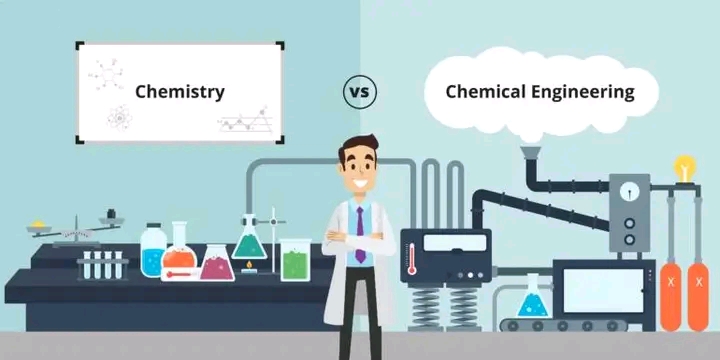
By Bilyamin Abdulmumin
If you are an Engineer or Scientist the chance is that you are much aware of the frequent comparison between a Chemist and a Chemical engineer.
To many, a Chemical Engineer is nothing but a glorified Chemist, in order words chemical engineers are just chemists in disguise. Sometimes when other students or colleagues at work want to tease Chemical Engineers they would refer to them as “Chemistry Engineers”.
One reason that making such claims linger is not unconnected with the amount of Chemistry the Chemical engineers offer. Because while other Engineering students especially electrical would offer chemistry courses in their first year of University only, Chemical Engineers would take Chemistry courses for at least three years during their undergraduate.
Like Chemistry courses, Chemists and Engineers also have many similarities in research areas, these research areas include catalysis, surface chemistry, material science, environmental science, biofuel, etc. The bulk of research similarities between Chemical Engineers and Chemists is as conspicuous as a tiger in a local market.
Another reason that is giving credibility to this argument is the job opportunities. In Nigeria, both Chemists and Engineers are found looking for jobs in similar places such as refineries, chemical industries, and wastewater treatment plants.
However, if carefully observed, right from the literal meaning of the names of these two professions, one can effortlessly pinpoint not only the similarities but the differences as well.
The chemistry of anything refers to the fundamental makeup of that particular material, for instance, the chemistry of water could refer to the interactions between the elements (hydrogen and oxygen) that make up the water molecule and between the molecules of water, hence providing the knowledge governing properties of the water such as polarity.
Take contaminated water for example containing various contaminants, with the knowledge of the chemistry of these contaminants, pure water could be conveniently separated. This is a chemistry at glance.
But Chemical Engineer expertise comes to play a role here by utilizing this Chemistry knowledge to meet the demand of the community or industry. This demand could be a supply of 1 million liters of domestic or industrial water per day.
The engineer would design the wastewater treatment plant, transport this contaminated water from a source down to the plant, size every unit in the plant ( such as sedimentation, oxidations, disinfection units, etc), and the engineer would also estimate the plant energy requirements while, in overall, putting into consideration the profit, safety, environment, and jurisdiction.
As depicted in the attached photo of this article, Chemists operate at the laboratory or pilot plant level while a Chemical Engineer is much more concerned with upscaling the process to a mega industrial level.
Let’s take on another fantastic example, a crude oil refinery. The wastewater treatment is just a dress rehearsal for crude oil refining. The Chemist would provide the knowledge of the physical and chemical properties of different constituents of the crude oil, based on which crude oil would be separated into its constituent ( e.g petroleum, kerosene, diesel, etc), cracking some into other smaller ones (e.g cracking bitumen into petroleum) or reforming complex ones into finer ones (e.g naphtha to petroleum), changing the shape of some straight ones to better-branched ones (isomerization). Chemists would do all of these at a laboratory scale. By comparison, the chemical engineer would scale up the knowledge to design and develop what we see as crude oil refineries and petrochemical plants.
Other industries where such examples of intertwined roles between Chemist and Engineer criss-cross are Fertilizer, Nuclear Energy, Industrial Chemicals, Petrochemicals, Food and Beverages, Pharmaceuticals, etc.
In a (saner climes) country where industrial activities are booming, Chemists would be preoccupied with research developing a new product, finding new raw materials, or improving the conversion process of existing raw materials but at a laboratory or pilot scale, while chemical engineers would be much concerned with scaling up of these findings to an industrial level by design and developing new plants or improving the efficiency of the existing ones.
But at the student level, Chemistry and Engineering students meet in the reactions and kinetics of the material (which is the heart of any industrial processing), but the chemistry student differs from his Engineering counterpart by having a deeper knowledge of Chemistry such as the application of Quantum Mechanics as well as Computational Chemistry while engineering students would deal with fundamental Chemical Engineering courses like Fluid Mechanics and Thermodynamics.


